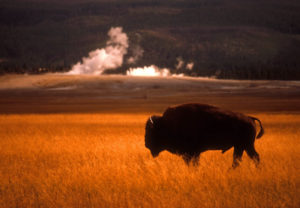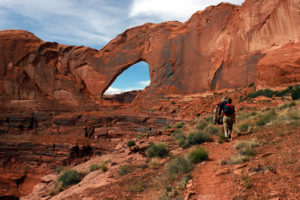
Bison roam Yellowstone National Park. Photo by Dennis Cox/WorldViews
National Travel & Tourism Week, which runs this year from May 7-13, is a time to celebrate the impact that travel and tourism have on the U.S. economy.
And it’s huge. According to the U.S. Travel Association:
- In 2016, domestic and international travelers spent a combined $683 billion on leisure travel in the U.S. When you add in business travelers, the total is almost $1 trillion — some $31,500 spent per second.
- That same trillion-dollar spending generated $2.3 trillion in total economic output in the U.S., factoring in an additional $1.3 trillion spurred in other industries, such as retail.
- The travel industry supports 15.3 million American jobs — 8.6 million directly in the travel industry and 6.7 million in other industries.
- One of every nine jobs in the U.S. is dependent on the travel industry, which ranks seventh among private sector employers.
- Travel ranks in the top 10 industries in 49 states and the District of Columbia
- The U.S. had 76 million international arrivals in 2016, who spent $246 billion — $4,360 on average for stays of 18 nights — supporting 1.2 million U.S. jobs.
- The top five leisure activities for international visitors to the U.S. are , in order, shopping, sightseeing, dining, national parks/monuments, and amusement/theme parks.
Economic Benefits Under Threat
These statistics are particularly significant because international arrivals to the U.S. have been plummeting since the current administration announced its various versions of travel bans that would affect a number of Muslim-majority countries.

Utah’s Escalante National Monument is a national treasure. Photo by Mitch Stevens
While the bans are currently tied up in the courts, the effect has been to create uncertainty among many potential visitors from around the globe, who don’t know whether or not they’ll be hassled at airports on arrival or denied entry altogether. The U.S. now appears more unwelcoming than previously, so why take a chance on coming to America?
Lately there’s also been talk in Washington of even making citizens of close U.S. allies obtain visas before visiting the U.S. This would almost certainly result in millions of fewer overseas visitors. At best, they’ll postpone their trips here until such restrictions are eased, but in many cases, they’ll take their vacations elsewhere — permanently.
Finally, the current administration is in the process of reviewing the status of a number of protected national monuments, labeling some of the country’s most precious natural areas the subject of a “federal land grab.”
Note again the number four preferred activity of international leisure travelers to the U.S.: visiting national parks and monuments. (Domestic travelers rank them highly as well.)
During National Travel and Tourism Week, let’s stop and ponder what it would mean to the economy, our livelihoods, and our overall quality of life if the American travel industry takes a major hit due to shortsighted policies in Washington.
The travel industry may not get the headlines, but there’s much more to the U.S. economic engine than manufacturing, fossil fuels, and real estate.
Reader Comments:
|
surfcyclinghawaii.com surfcyclinghawaii9@gmail.com |
Thank you For share valuable travel information. |












6 Responses to Happy National Travel & Tourism Week